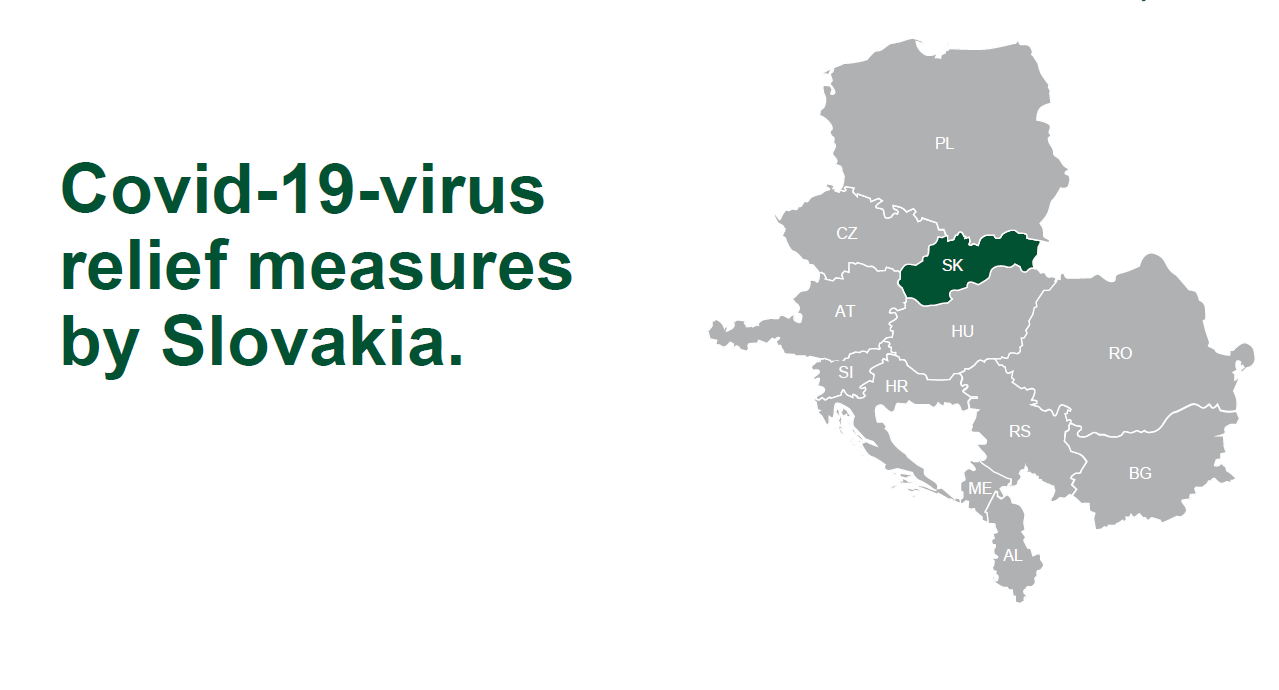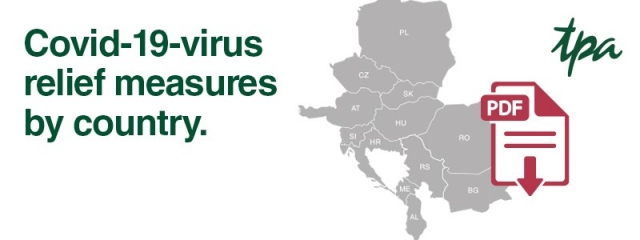
25.05.2020
Emergency measures in Slovakia to mitigate the negative impact of the COVID-19 pandemic
On Wednesday 22 April 2020, the Slovak National Council approved an amendment to Act No 67/2020 on certain emergency measures in conjunction with the spread of the dangerous contagious human disease COVID-19, as amended by Act No 75/2020 and Act No 461/2003 on social security. All acts have been published in the Collection of Laws under Nos 96/2020 and 95/2020.
Below are the most important changes and measures adopted:
1. INCOME TAX
Income tax advance payments
Taxpayers will not have to pay income tax advance payments due during the pandemic period for the period immediately following a period in which their revenue has fallen by at least 40% compared to the same period in the previous calendar year. The period under consideration is either a calendar month or quarter, depending on which period the taxable entity has designated for paying income tax advances.
Taxpayers must declare non-payment of advances by submitting a declaration that they meet the above conditions. The declaration must be sent to the relevant tax authority no later than 15 days prior to the payment deadline for the relevant income tax advance.
This provision will apply for the first time for income tax advances due in May 2020.
This procedure may also be applied by taxpayers who make income tax advance payments in any other way based on a decision by the tax authority.
Deduction of a tax loss
Taxpayers may deduct unused tax losses for accounting periods ending in the years 2015 to 2018, in a total amount of EUR 1 million, from the income tax base for the accounting period for which the deadline for submitting an income tax return occurs in the period from 1 January 2020 to 31 December 2020.
Taxpayers whose accounting period coincides with the business year may apply these losses in the tax return for the accounting period ending 31 October 2019 at the earliest.
Tax losses shall be deducted consecutively from the earliest reported tax loss to the most recently reported tax loss.
This new method for deducting losses is not mandatory. If the existing method for deducting losses pursuant to the applicable provisions of Section 30 of the Income Tax Act is more beneficial for taxpayers, tax losses may be deducted using the standard procedure.
2. VEHICLE TAX
Vehicle tax advances
Starting in April 2020, taxpayers are not required to pay vehicle tax advances due during the pandemic period. Taxpayers who do not pay them immediately shall settle vehicle tax within the vehicle tax return submission deadline.
3. TAX ADMINISTRATION (The Tax Code)
Missing a deadline
It has been specified that a pardon for missing a deadline does not cover filing a control statement, a recapitulative statement or payment of tax advance payments.
Tax inspection – suspension
The provision on the suspension of a tax inspection is replaced with the following new provision:
A taxable entity must request the suspension of a tax inspection. Based on the request, the tax inspection shall be suspended from the day following the day the request is submitted until the end of the pandemic period.
Tax inspections suspended until now will continue unless their suspension is requested by the taxable entity, or if the reasons for which the tax inspections were suspended cease to exist.
Suspension of tax proceedings
The previous provision on the suspension of tax proceedings shall be replaced with the following new provision:
Tax proceedings shall only be suspended upon request by a taxable entity, from the day following the day the request is submitted until the end of the pandemic period.
Tax proceedings which were suspended until now will continue unless their suspension is requested by the taxable entity, or if the reasons for which the tax proceedings were suspended cease to exist. The legal effects of acts carried out during tax proceedings suspended until now shall remain.
Tax credit
A credit for income tax from a tax return which has been submitted during the pandemic period will be returned to the taxpayer within 40 days of the end of the calendar month in which the taxpayer has submitted the income tax return.
Any income tax credit from a tax return for the accounting period of the calendar year 2019, which was submitted between 1 January 2020 and the start of the pandemic period, will be returned by the tax authority within 40 days as of 31 March 2020.
In this case the tax authority will also take into account the provision regarding the use of a tax credit pursuant to the Tax Code.
Administrative offences and penalties
If a tax credit is reduced for the taxpayer, after a tax inspection or by submitting a corrective or supplementary income tax return, the taxpayer will be fined with 100% of the stated difference, and will obviously have to repay this difference. A fine will not be imposed only if the taxpayer submits an income tax return that reduces the tax credit before it is refunded.
The aim of this regulation is to prevent speculative behaviour by taxpayers or the abuse of earlier refunds of tax credits.
Interest on late payment will apply if the taxable entity fails to pay the tax advance payment, withholding tax or an amount withheld to guarantee tax payments in time.
4. CASH REGISTERS
Fulfilment of notification obligations
If a deadline to meet notification obligations occurs during the pandemic period, this obligation will be considered to have been met if the relevant facts are notified by the end of the calendar month following the end of the pandemic period.
This refers to fulfilment of the following obligations: notification of a change of business name, a point of sale, if different from the place of business or registered address, or a change to the main line of business according to the Statistical Classification of Economic Activities, in which an e-cash register is used by the client.
Due dates for fines
An on-the-spot fine during the pandemic period is due by the end of the calendar month following the end of the pandemic period.
5. VALUE ADDED TAX AND EXCISE DUTIES
Publication of lists
A VAT payer who repeatedly fails during the pandemic period to file a VAT return or a control statement, or repeatedly fails to pay the resulting tax liability, will not be published in the list of VAT payers for whom grounds for cancelling registration have arisen, if these obligations are met by the end of the calendar month following the end of the pandemic period.
Conditions for refunding an excess VAT
For a VAT payer who has incurred arrears for customs duty or mandatory insurance payments during the pandemic period, these arrears will not be taken into consideration for the purpose of an early refund of an excess deduction, i.e. the conditions for an early refund of an excess deduction shall be considered to have been met if these arrears are paid by the end of the calendar month following the end of the pandemic period.
Applying a preferential rate of excise duty
Taxable entities who apply a preferential rate of excise duty on mineral oil and are unable to demonstrate that the conditions have been met during the pandemic period, i.e. they are unable to provide a statement of origin for biofuel or bioliquid to the effect that any biogenic substance meets the sustainability criteria, may apply this reduced tax rate if they demonstrate that these conditions have been met for each accounting period falling within the pandemic period by the end of the calendar month following the end of the pandemic period.
Presence of a customs office employee
If it is not possible during the pandemic period to secure the presence of a customs office employee to perform tax supervision, the customs office shall determine an alternative method for performing tax supervision.
Withdrawal of authorisation and deregistration
If a taxable entity breaches any obligations stipulated by special legislation during the pandemic period due to the negative impact of the pandemic, the customs office may waive the obligation to withdraw authorisation or deregister the taxable entity.
6. LOCAL DEVELOPMENT FEE
Deadline to meet a notification obligation
A deadline to meet a notification obligation regarding the end of a fee obligation, or to meet a notification obligation regarding the floor area measurement of an above-ground part of a finished building pursuant to special legislation, which did not expire prior to the start of the pandemic period or which started during the pandemic period, shall be considered to have been complied with if this obligation is met by the end of the calendar month following the end of the pandemic period.
Use of the fee
During the pandemic period, until 31 December 2020, a municipality, based on a decision made by the council, may use revenue from the local development fee to cover current expenditure
7. SOCIAL SECURITY
Social security contributions for employers and mandatory sickness and pension insured self-employed people
Employers are not required to pay the employer’s social security contribution and self-employed with mandatory sickness and pension insurance is not required to pay social security contributions for April 2020, if their business was closed in April 2020 for at least 15 days, on the basis of a decision by a competent authority. The Slovak Government will be able to establish a further period in which there will be no obligation to pay social security contributions by government decree.
Closure of a business shall be proven by an entity in an affidavit submitted to the Social Security Office no later than the 8th day of the calendar month following the calendar month in which it is required to pay the social security contribution. Employers and self-employed are still required to pay contributions for their employees.
8. LOCAL TAXES
Deadline for filing a return
The deadline for filing a property tax return, dog tax, vending machine tax or non-gambling gaming machines tax return or any of them, or a partial return for these taxes, which did not expire prior to the start of the pandemic period or which started during the pandemic period, shall be considered to have been complied with if the return is filed by the end of the calendar month following the end of the pandemic period.
A deadline to meet a notification obligation which did not expire prior to the start of the pandemic period, or which started during the pandemic period, shall be considered to have been complied with if the notification is submitted by the end of the calendar month following the end of the pandemic period.
Stay healthy!
Interactive PDF with all COVID-19 measures by country:
The governments of different countries have decided on immediate actions to moderate the impact of the Covid-19 pandemic on their national economy. Our local experts from CEE/SEE present the details of the COVID-19 virus relief measures by 12 countries.

